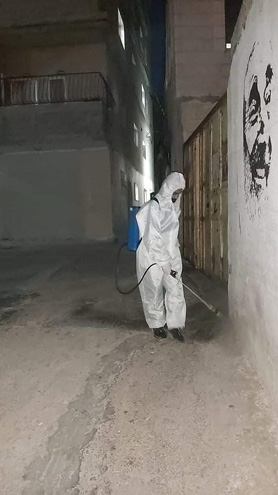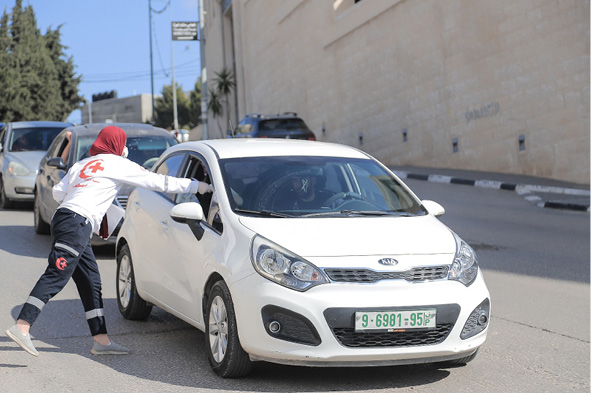The Palestinian Medical Relief Society (PMRS) was founded in 1979 by a group of health professionals to close the gaps identified in the existing but impoverished health care system in Palestine. It aims to deliver a rights-based approach to health for all Palestinians who live under the occupation. It remains the largest and only united Palestinian grassroots health organization, operating across the West Bank, including Jerusalem, Area C, Hebron, and the Gaza Strip.
From our inception, we have endeavored to care for our most vulnerable population segments, including women, children, the elderly, Bedouin communities, and individuals with disabilities or from lower socio-economic backgrounds. We have also built a network of mobile clinics to deliver health care to persons who live in the most remote and rural areas and who frequently lack equitable access to quality health care, cut off from mainstream services by checkpoints and settlements. Our mission is to ensure that all Palestinians are empowered and equipped to access equitable, quality health care, enabling them to enjoy their full human rights and live healthy, prosperous lives.

In March 2020, amidst the seemingly intractable and ongoing preexisting humanitarian crisis caused by the occupation, the first cases of COVID-19 were confirmed in Bethlehem. Since that initial outbreak in Palestine, PMRS has reacted expediently and with agility to ensure the safety of our communities. We remain guided by our overarching principle and longstanding ethos and operating modus: applying a collective and collaborative approach to efforts to reduce the infection rate, limit the spread of the novel coronavirus, and flatten the curve – while continuously supporting our communities and caring for their everyday, primary health care needs. We extended our outreach model to ensure that we reach the most vulnerable, isolated population groups while supporting the already overburdened hospital and over-extended public health care systems in dealing with COVID-19 cases and the usual noncommunicable (chronic) conditions.
Engaging and leading a collaborative approach involved coordinating and working with local communities and established organizations such as community-based organizations (CBOs), women’s organizations, other local institutions, and international nongovernmental organizations (INGOs). Furthermore, all our actions continue to be planned and carried out in collaboration and compliance with the relevant national and international authorities, including the World Health Organization, the emergency health cluster, the Ministry of Health, and other relevant government bodies. Such proactive collaboration and coordination are essential to achieve the best possible outcomes. During this process, we found that the resilience of our staff, volunteers, communities, and local organizations has once again proven to be an inspiration and an asset, and has supported our efforts to act expediently and flexibly when conditions rapidly changed. They managed to act while facing the daily challenges of living under military occupation. We struggled to ensure our communities’ compliance concerning the implementation of self-isolation and social distancing, and engaged in safeguarding support of our efforts to maintain a robust primary health care function while working within the confines of the lockdown laws.
As schools and universities have reopened, and some localities have eased lockdown measures, PMRS continues to collaborate with local entities to help prevent a sharp rise in the second wave. We have worked closely with schools and universities to provide them with adequate support in educating the students about social distancing and safety measures.
While all primary health care services have been adapted to and redesigned in line with current safety precautions to reduce the rate of infection, home visits are conducted when possible, mobile-clinic visits continue, and we have funneled existing staff and volunteers from other nonessential services/projects into our COVID-19– related efforts. We have utilized the technologies available to us to ensure that essential services, such as women’s health and mental health, are not forgotten or left un-serviced. One of our greatest innovations has been the establishment of various needs-specific Facebook pages and hotlines that provide real-time support and advice, including one with COVID-19–related content and another one specifically to support women and create a safe space that provides online consultation and is ready to respond to emergency calls. In addition, we established hotlines for mental health support and other health-related support/advice. Our hotlines, staffed by health workers that include psychologists and doctors, proved to be a popular and essential service during the pandemic. We especially noted an increase in calls related to mental health and gender-based violence (GBV). This is a service that we will consider continuing post–COVID-19, as the geographical restrictions imposed by the military occupation can somewhat be surpassed using such a tele-health model.
PMRS continues to work with isolation centers and conducts home visits and checkups for those isolating at home.
Overall, 50 (plus) primary health care and various other project functions continue to operate across Palestine, including the West Bank, East Jerusalem, Hebron, Area C, and the Gaza Strip. In many instances, our staff has operated two shifts in areas with high caseloads. We have worked to adapt our women’s health programs to help prevent GBV and support those affected by GBV, given that during high-stress periods, including financial stresses (due to job loss), there is an undeniable increase in such incidents. Therefore, we offer online courses to support women who have various concerns, including how to cope with increased pressures in their homes, as husbands and children may be self-isolating, how to keep children engaged and compliant with lockdown restrictions, what to do in case of GBV-related concerns, and other up-skilling opportunities, including vocational and advocacy training. We continued to work very closely with women’s shelters, supporting them with COVID-19–related materials and hygiene kits and assisting their efforts to support women during such a stressful period. Overall, our women’s health programs have reached more than 50,000 women.

Within the communities, we have activated the PMRS-run youth groups and our own volunteer network to support the health workers or those most vulnerable, such as single mothers at home, the elderly, orphans, and other less-mobile community members. These volunteers deliver medication and treatment at home or provide other essential support services, such as distributing food and care packages of essential items. Furthermore, our teams positioned themselves at village entrances to educate workers returning from Israel and to conduct infection screening. Many youth and other volunteers had already been trained in first aid and emergency response, and we provided further COVID-19–specific training to support their efforts.
One of our paramount efforts was the delivery of COVID-19–related public-health-specific education and awareness programs. Our experience informed our face-to-face approach, whereby our health teams and volunteers mobilized to deliver flyers and engaged in conversations with various community members regarding their role and responsibility concerning lockdown rules and the need to use PPE, such as masks and gloves. In addition, we distributed information flyers and booklets outlining ways in which the communities could take care of their overall health, including their nutrition and mental health. We delivered a total of over one million flyers, booklets, and posters across more than 650 communities in the Gaza Strip and the West Bank.
PMRS endeavors to scale and further galvanize its mental health and psychosocial health care services, with a particular focus on youth, who have found the social restrictions particularly devastating, as this is often their only outlet for dealing with the daily reality of military occupation.
Further assisting local communities, our volunteer network worked with local businesses and organizations to ensure that they were COVID-19 safe and prepared. Hundreds of localities received support in sterilizing communal areas such as supermarkets, ATMs, banks, and more in efforts to assist the communities in flattening the curve. Food supplies, medications, and PPE were provided to all homes for older people and to older individuals in the West Bank and Gaza Strip.
Our mobile outreach teams and clinics delivered hundreds of thousands of masks, thousands of units of sanitizer and gloves, hundreds of thermometers and gowns. In addition, thousands of packages of food or other essentials have been distributed across the most vulnerable groups to serve the communities’ everyday needs during such unprecedented economic distress, hoping to ameliorate some of the more immediate ramifications of a population facing rates of more than 60 percent unemployment and persons living below the poverty line. In an effort to strengthen the work of those attempting to flatten the curve, hundreds of hygiene packs were distributed to those in need; to support our women’s shelters and programs, we distributed hundreds of dignity packs for women to equip them with essential feminine hygiene care. Lastly, we are working to support our own staff/volunteers to stay safe both by providing mental health support and debriefing and by aiming to ensure that any risk associated with the occupation is considered and mitigated as much as possible. Our health college is conducting online education sessions to continue supporting the growth and development of the community and our staff – who have consistently risen to the challenges associated with the complex reality of life under military occupation, amidst a global pandemic.

As of November 2020, we continue our efforts to flatten the curve and tend to the social, mental, and physical needs of our communities. According to OCHA’s most recent report as this article is being prepared for publication, there have been 81,294 confirmed cases of COVID-19, with 7,455 active cases currently. The total number of deaths since the initial outbreak stands at 687. The Palestinian Ministry of Health and WHO indicate that these figures are likely to underrepresent the actual number of cases due to testing constraints. PMRS continues to work with the emergency cluster and local authorities to coordinate and adapt its efforts in weekly meetings, developing the relevant policies in accordance with the Inter-Cluster Coordination Group (ICCG).
We understand that the work continues and that great gaps remain in the available health care services and equipment. According to OCHA, two million masks, gloves, and laboratory test kits are lacking, and there is a shortage of ventilators and hospital beds, including ICU beds. Due to the preexisting health care-budget deficit, the oPt now urgently requires US$31,304,992, with only 41 percent of the budget needs covered thus far. We intend to continue our focus on the most vulnerable population groups, in particular women, youth, the elderly, and those with health complications. Of particular concern is the rise in mental health complications, including suicidal ideation and attempts, with an increase in the number of deaths by suicide.
Overall, we are pleased with the impact we have had thus far and with the overall collective effort we have witnessed within each community. When comparing the statistics to other regions globally and considering our impoverished infrastructure, we see that the Palestinian people have responded extremely well to the situation and adapted individually while keeping their community in mind.
PMRS considers this crisis to be an opportunity to work collaboratively with our communities, our local organizations, and INGOs to hopefully, in the short term, protect people from COVID-19 and, in the long term, support their right to access quality, equitable health care for all.
Over the years, PMRS and the Palestinian people have repeatedly proven to be resilient in the face of adversity. Once again, this can be seen to be true, and it is this agility, experience with emergency situations, preparedness, and overall civic-mindedness that has contributed to the positive results until now. While a lot of work remains to be done and we can continue to reduce the rate of infection and flatten the curve, some comfort can be drawn from our recent successful responses during what has been, for most, a disconcerting and uncertain time.
PMRS sees this as an opportunity to grow and learn as an organization, building on our existing internal, organizational resilience and overall emergency preparedness. Furthermore, we see this as a chance to galvanize existing relationships and to find new ways of cooperation that could overall and collectively lead to long-term positive impact beyond the pandemic. This mindset will certainly be necessary for the post–COVID-19 recovery phase.


